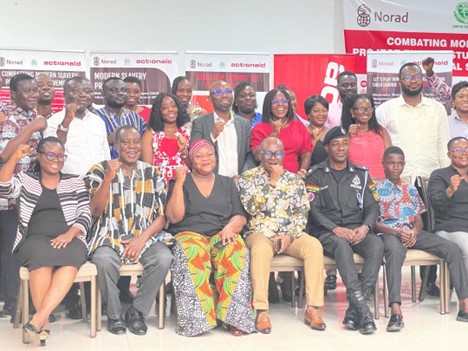By Deborah Asantewaah SARFO
In line with goal 8 of the Sustainable Development Goals (SDGs), specifically target 8.7, ActionAid Ghana has embarked on a three-year project dubbed “Combatting Modern Slavery” (CMS) project in Ghana and Ethiopia, leading to the rescue of 61 vulnerable survivors of various forms of modern slavery.
Funded by the Norwegian Agency for Development Cooperation (Norad), with a tune of US$1,293,229.69, the CMS project created a platform for an effective collaboration with law enforcement authorities such as the Ghana Police Service, Ghana Immigration Service and community-level actors including Community-Based Anti-violence Teams (COMBATs), who assisted in the rescue of the 61 survivors.
The survivors consisting of both nationals and foreigners, were also re-integrated. This achievement of the project among others, were announced by the Country Director of ActionAid Ghana, John Nkaw, at the national CMS endline study validation report event.
The project was aimed at decreasing the scale and prevalence of modern slavery in the agricultural, industrial, and service sectors while raising awareness of modern slavery with a focus on child labour, human trafficking, and forced labour.
In Ghana, the project covered a total of 100 communities, with various activities working closely in four administrative regions and 12 districts.
With poverty being one of the push and pull factors in modern slavery, the project assisted 398 female household heads with livelihood skills making them independent and resourceful, thereby reducing their vulnerability and that of their children to modern slavery.
These individuals, residing in the four project regions – Bono (Jaman North, Jaman South and Tain) Northern (Savannah) (Nanumba South, Kpandai and East Gonja), Upper West ( Lawra, Sissala East and Wa East) and Oti ( Jasikan, Nkwanta South and Kadjebi) were also given start-ups equipment worth about GH¢1,994,306.63.
While prosecution secured a 10-year jail sentence on a child trafficking case through the CMS project, Mr. Nkaw highlighted the delay in tracking individuals and agencies who perpetuate modern slavery as a challenge.
He also identified logistical constraints of institutions and existing gaps in some of the laws as other challenges they encountered.
“There are a number of significant challenges. For example, to be able to track recalcitrant recruitment agencies that perpetuate issues of modern slavery, such as human trafficking, takes time. In addition to that, one of the challenges has been with legislation.
Secondly, you may agree with me that some of the institutions that we are working with have some logistical and human capacity constraints. Also, some of the laws are barely at the level of misdemeanour.
What that means is that it does not go with custodial sentences. And you know, as Ghanaians, one of the very punitive and deterrent measures is when people face the threat of being jailed,” he explained.
In response to the sustainability of the CMS project and its outcomes, he said ActionAid has mainstreamed the project into its regional institutionalised programming framework adding that, they will also give logistical support and capacity training to their partners and government institutions such as the Department of Social Welfare, Ghana Police Service and Ghana Immigration Service among others.
The Project Officer at the General Agricultural Workers Union (GAWU), of the Trade Union Congress (TUC) Bashiratu Kamal, emphasised on the need for an indepth education on the themes of modern slavery for all security services, urging the Commanding Officer at the National Police Training School, Chief Superintendent Mike Baah, to train the personnels on the forms of modern slavery.
“We need the police and the security personal to understand modern slavery and other themes from the onset. We want you to train them on human trafficking, child labour and forced labour so that when they come out, they will understand and have some basis,” she noted.
Other partners of the project include, Economic and Organised Crime Office ( EOCO), Chamber of Agribusiness Ghana (CAG), Ghana Enterprise Agency (GEA), Ministry of Justice and the Attorney General and GAWU among others.










